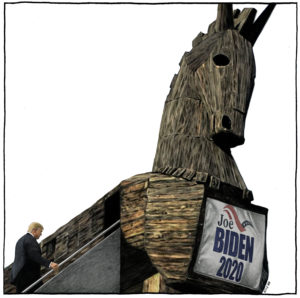Noam Chomsky: Centrism Will Only Get Us Four More Years of Trump
The activist and linguist has a warning for anyone getting too comfortable. Hatem Moussa / AP
Hatem Moussa / AP
Noam Chomsky is not here to reassure you. As Arctic ice melts, centrists in the Democratic Party actively hinder progress on “Medicare for All” and Republicans work equally hard on voter suppression, the activist, linguist and professor is sounding the alarm.
In an interview after last week’s Democratic debate, Chomsky spoke with Truthout’s C.J. Polychroniou about America’s political culture, the rise of democratic socialism, the Democratic Party’s fear of progressives, and why he finds it “psychologically impossible to discuss the 2020 election without emphasizing, as strongly as possible, what is at stake: survival, nothing less.”
According to Chomsky, another four years of Donald Trump “may spell the end of much of life on earth, including organized human society in any recognizable form.”
This is especially true when it comes to climate change, an existential threat that Trump continually plays down. Chomsky quotes Raymond Pierrehumbert, a lead author of the 2018 United Nations Intergovernmental Panel on Climate Change report. In a September op-ed for the Tucson Sentinel, Pierrehumbert wrote, “With regard to the climate crisis, yes, it’s time to panic.”
While other countries attempt to alleviate the effects of climate change, “Trump and the political organization he now virtually owns are taking steps, too—to exacerbate the crisis,” all the while threatening to use nuclear weapons, which could also destroy us if environmental decline doesn’t first, Chomsky says.
Our current political climate didn’t arrive in 2016, however—a point Chomsky emphasizes:
In recent years, the Republican Party has dedicated itself [with] such fervor to its constituency of wealth and private power that a voting base had to be mobilized on grounds unrelated to its primary policy objectives—with many dark forces. And it’s also worth recalling that there are parallels elsewhere, notably in Europe, with the collapse of centrist parties.
American institutions have consistently enabled these trends. When Polychroniou asks Chomsky what happens if Trump wins the Electoral College in 2020, if not the popular vote, Chomsky replies that he’s more worried the Senate, which he calls “radically undemocratic.” Multiple factors, he says, “are converging to a situation where a small minority—white, rural, Christian, traditional, older, fearful of losing ‘their America,’ will be able to dominate the political system.”
Chomsky refers to two bright spots in these dark times: the rise of democratic socialism, and a young, activist left (inspired by Bernie Sanders) that “doesn’t just show up every four years to push a button and then leave matters to their betters, but continues its activism and [engagement] in public affairs that is none of their business, according to long-standing democratic theory.” He’s also somewhat hopeful about worker-owned cooperatives that challenge traditional business structures. Chomsky calls these developments “a bare sample of considerable ferment that could open the way to a much more free and just social order—if imminent looming catastrophe can be overcome.”
Read the full interview at Truthout.
Your support matters…Independent journalism is under threat and overshadowed by heavily funded mainstream media.
You can help level the playing field. Become a member.
Your tax-deductible contribution keeps us digging beneath the headlines to give you thought-provoking, investigative reporting and analysis that unearths what's really happening- without compromise.
Give today to support our courageous, independent journalists.






You need to be a supporter to comment.
There are currently no responses to this article.
Be the first to respond.